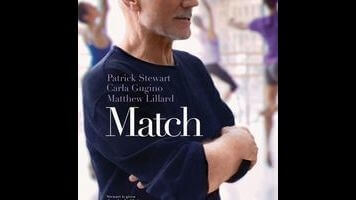When in doubt, playwright Stephen Belber apparently opts to place two male characters and one female character in a room, supplying one of them with a tape recorder and at least one of them with a hidden agenda. That scenario describes Tape, Belber’s 1999 play (adapted into a movie by Richard Linklater, and widely considered one of his weakest films), and it also describes Match, which makes its way to the screen a decade after its Broadway premiere. This time, Belber, who made his directorial debut with the little-seen Jennifer Aniston comedy Management, opted to helm the film himself, which is problematic in that he has little clue what to do with a camera, especially when the action is confined largely to a single small location. (For an example of what a real director can do with a single room, see the just-released Criterion edition of Rainer Werner Fassbinder’s The Bitter Tears Of Petra Von Kant.) Match is a better play than Tape, however, and that, along with an accomplished central performance, compensates a little for the déjà vu.
The setup doesn’t look promising. Patrick Stewart plays Tobias “Tobi” Powell, a dance instructor at Juilliard who leads a solitary but apparently comfortable life. He’s agreed to grant an interview to a woman named Lisa (Carla Gugino), who’s writing her dissertation on the history of choreography. That’s her story, but it becomes tenuous once her husband, Mike (Matthew Lillard), who was just supposed to handle the tape recorder, starts butting in to ask questions of his own—questions that have little to do with choreography, and which seem fixated on the details of Tobi’s promiscuous sex life during a very specific period of the mid-1960s. It’s so obvious what’s really going on that the seemingly endless stretch of Match during which Tobi fails to catch on—blithely and cluelessly attempting to nudge the conversation back to his career—gets increasingly painful to endure. At long last, the light dawns and the recriminations begin in earnest, threatening to explain the title by turning the movie into one big shouting match.
Thankfully, that doesn’t happen. Unlike Tape, which adds a third character fairly late and then continually cranks up the angst, Match gets pared down to a delicate two-hander in its midsection, after Mike storms out of Tobi’s apartment and Lisa chooses to stay. Once Tobi is no longer being ambushed and assaulted, he comes clean, and Stewart (playing the role originated onstage by Frank Langella) digs deep into the pathos of a man who made a momentous decision long ago that he regrets and doesn’t regret with nearly equal fervor. What initially seemed like an overly broad, slightly stereotypical performance, heavy on winking bonhomie, is revealed as the instinctive defense mechanism of the terribly lonely, and Stewart’s gentle yet forceful work is well matched by Gugino, who taps complementary frustrations in Lisa. Their lengthy pas de deux is so relaxed and affecting that it’s a bit of a bummer when Mike returns for a final confrontation. (Lillard is fine; it’s the character who’s somewhat thinly conceived.) Drama is driven by conflict, but in this particular case it’s the calm between the storms that captivates.


 Keep scrolling for more great stories from A.V. Club.
Keep scrolling for more great stories from A.V. Club.